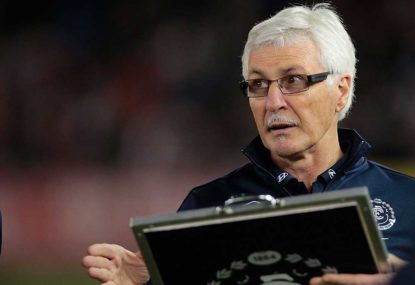As Mick Malthouse prepares to break Jock McHale’s AFL/VFL record for most games coached, it may seem strange that more than three decades of life in the coaching meat-grinder has left him still so sensitive to criticism.
One might have thought by now that savage press criticism and speculation over his future should be as much of a shock to Mick’s system as the news that the hands-in-the-back rule is inconsistently enforced.
Yet here he is, the Hillary Clinton of the AFL, stressed, depressed and wrung out by the media siege, lashing out desperately at the vultures circling ever lower over his head.
Malthouse cannot quite believe the way he’s been disrespected of late, which proves 713 games in the coach’s box isn’t enough to teach you a fundamental truth of coaching: respect is not part of the deal.
Oh sure, when you’re winning premierships and bringing about vast improvements in the workrate and team ethos of promising young players, you’re the footballing world’s darling. Everyone will laud your disciplinary methods and nimble match-day manoeuvres, and you’ll fall under the spell. You’ll truly believe you’ve earned our respect.
This is a mirage. As soon as the tide turns – which tides tend to do fairly often – you’ll discover that nobody ever respected you, that we were all just waiting for our chance to pounce, to loudly denounce your inflexible game plans and anachronistic approach to player development. We sat by patiently until the perfect moment to say, “He’s too old.”
It’s amazing that though he began his coaching career in 1984, Mick still doesn’t know that the football media’s very existence is devoted to inducing crippling depression in coaches and making wives cry. If after 31 years, 713 games and three premierships, he can’t get no respect, it’s just not on the cards.
And that’s why we all should take a valuable lesson from the whole affair: becoming a coach is the worst decision anyone could possibly make.
I beg you to heed my warning. If you are a footballer, or indeed a sportsperson of any kind, please, for the love of God, do not consider a future in coaching. If you are a parent with a child who expresses an interest in one day entering the coaching industry, push them with as much speed and vigour as possible into piano lessons and/or recreational drugs. If you are currently an assistant coach, resign with immediate effect and flee into the wilderness.
There are times when being a coach might look like an attractive, even glamorous job. Seeing a coach hold a cup aloft, one may find oneself feeling envious of that moment of triumph. But is one night with a supermodel worth it, if that supermodel spends every other day of your life punching you in the face? For a coach, football is the supermodel: she may, if so inclined, provide a moment or two of ecstasy, but 99 per cent of her time will be spent making you bruised and miserable.
What makes a man want to be a coach? Some have fallen in with the wrong crowd. Young men like Mark Thompson, James Hird and Damien Hardwick fell upon their ruinous path due to the bad influence of well-known shady character Kevin Sheedy, a man who destroyed his own life with coaching and therefore became determined to destroy as many other people’s the same way.
In other cases, it’s sheer rebelliousness. Terry Wallace, for example, became a coach mainly because his mother wouldn’t let him borrow her car. Ross Lyon took up coaching out of pure pigheadedness to defy his father’s demands he work in the family bait shop.
But in many cases, coaching is a result of desperation. So often, a man becomes a coach not because he wants to, but because he has no other viable options. After all, at the end of his playing career, the only real skills a footballer possesses are kicking, handballing, tackling and drunk driving.
It’s either become a coach or a commentator, and sadly not everyone possess the nerves of steel required to work alongside Brian Taylor for three hours at a time. So they drift into this most destructive of professions.
So sure, we need better education, we need training. We need greater funding for schemes to redirect players into fulfilling careers post-retirement, and for early intervention programmes to make children aware of the dangers of coaching. And we need deprogramming solutions for those who have already become coaches.
But these are long-term solutions. In the short term, we need to pay attention to the cautionary tale of Malthouse, and stay vigilant lest any of our loved ones stray in the coaching direction.
If you notice anyone you know displaying coaching tendencies, notify the authorities. Lure them into a secure location and restrain them by whatever means possible. Send them on long overseas holidays. Shanghai them into a foreign navy. Whatever you do, do not let them pick up a clipboard.
Don’t let your friends or family end up like Mick Malthouse. Fight coaching today.



































































































